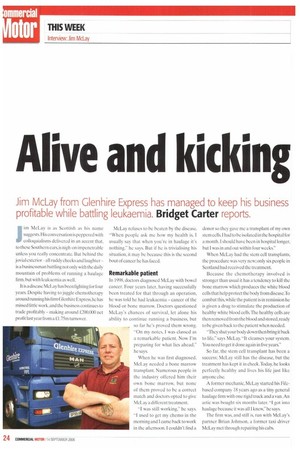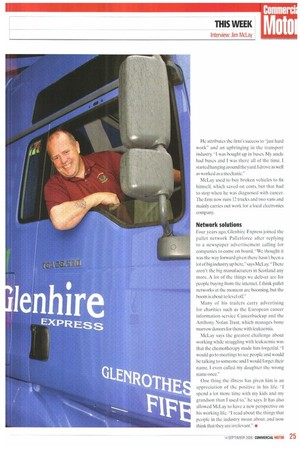Alive and kicking
Page 24

Page 25

If you've noticed an error in this article please click here to report it so we can fix it.
Jim McLay from Glen hire Express has managed to keep his business
profitable while battling leukaemia. Bridget Carter reports.
Jirn McLay is as Scottish as his name suggests. His conversation is peppered with colloquialisms delivered in an accent that, to these Southern ears, is nigh-on impenetrable. unless you really concentrate. But behind the jovial exterior .all ruddy cheeks and laughter — is a businessman battling not only with the daily mountain of problems of running a haulage firm, but with leukaemia as well.
It is a disease McLay has been fighting for four years. Despite having to juggle chemotherapy around running his tinn Glenhire Express. he has missed little work, and the business continues to trade profitably — making around £200.000 net profit last year from a £1.75m turnover. McLay refuses to be beaten by the disease. "When people ask me how my health is. I usually say that when you're in haulage it's nothing." he says. But if he is trivialising his situation, it may be because this is the second bout of cancer he has faced.
Remarkable patient
In 1998, doctors diagnosed McLay with bowel cancer. Four years later, having successfully been treated for that through an operation, he was told he had leukaemia — cancer of the blood or bone marrow. Doctors questioned McLay's chances of survival, let alone his ability to continue running a business, hut so far he's proved them wrong. "On my notes, I was classed as a remarkable patient. Now I'm preparing for what lies ahead," he says.
When he was first diagnosed, McLay needed a bone marrow transplant. Numerous people in the industry offered him their own bone marrow, but none of them proved to be a correct match and doctors opted to give McLay a different treatment.
"I was still working,he says. "I used to get my chemo in the morning and I came back to work in the afternoon. I couldn't find a donor so they gave me a transplant of my own stem cells. I had to be isolated in the hospital for a month. I should have been in hospital longer, but I was in and out within four weeks."
When McLay had the stem cell transplants, the procedure was very new; only six people in Scotland had received the treatment.
Because the chemotherapy involved is stronger than usual it has a tendency to kill the bone marrow which produces the white blood cells that help protect the body from disease.To combat this, while the patient is in remission he is given a drug to stimulate the production of healthy white blood cells. The healthy cells are then removed from the blood and stored, ready to be given back to the patient when needed.
"They shut your body down then bring it back to life," says McLay. "It cleanses your system. You need to get it done again in five years."
So far, the stem cell transplant has been a success: McLay still has the disease, but the treatment has kept it in check. Today, he looks perfectly healthy and lives his life just like anyone else.
A former mechanic, McLay started his Fifebased company 18 years ago as a tiny general haulage firm with one rigid truck and a van. An artic was bought six months later. "I got into haulage because it was all I knew," he says.
The firm was, and still is, run with McLay's partner Brian Johnson, a former taxi driver McLay met through repairing his cabs. He attributes the firm's success to "just hard work" and an upbringing in the transport industry. -I was bought up in buses. My uncle had buses and I was there all of the time. I started hanging around the yard. I drove as well as worked as a mechanic."
McLay used to buy broken vehicles to fix himself, which saved on costs, but that had to stop when he was diagnosed with cancer. The firm now runs 12 trucks and two vans and mainly carries out work for a local electronics company.
Network solutions
Four years ago, Olenhire Express joined the pallet network Palletforee after replying to a newspaper advertisement calling for companies to come on board. "We thought it was the way forward given there hasn't been a lot of big industry up here," says McLay. "There aren't the big manufacturers in Scotland any more. A lot of the things we deliver are for people buying from the internet. I think pallet networks at the moment are booming, but the boom is about to level off," Many of his trailers carry advertising for charities such as the European cancer information service Cancerbackup and the Anthony Nolan Trust, which manages bone marrow donors for those with leukaemia.
McLay says the greatest challenge about working while struggling with leukaemia was that the chemotherapy made him forgetful. "I would go to meetings to see people and would be talking to someone and I would forget their name. I even called my daughter the wrong name once."
One thing the illness has given him is an appreciation of the positive in his life. " spend a lot more time with my kids and my grandson than I used to," he says. It has also allowed McLay to have a new perspective on his working life. "I read about the things that people in the industry moan about, and now think that they are irrelevant." •
































































































































































































